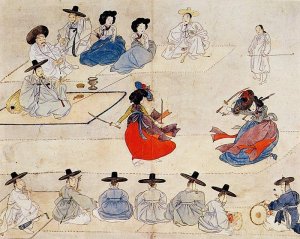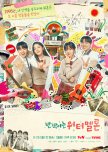
Light and Shadow
“An artist should recognize a metaphor” a character tells the show’s protagonist towards the end. And like Jin Soo Wan’s earlier shows, this one uses metaphor (in this case the trope of time travel) to explore how pain can become the garden in which art and joy grow, how parents can fail and save their children, and how it is not luck or fame or fortune but love that keeps us rooted in this broken world.Most shows hesitate to mix comedy with serious themes, as if by merging the two, they’ll either destroy the lightness of the former or dilute the gravitas of the latter. Twinkling Watermelon explores child abuse, neglect, suicidal ideation, and discrimination against the deaf community, but it does so amidst a candy-colored swirl of music and unbridled teen exuberance. Its characters face real trauma, but they also laugh and flirt and rock out with their friends and wear their hearts on their sleeves for all to see. There are few dramas as unapologetic in their delight as this one, and even when plot points get messy or a random gang of thugs appears, the show’s warmth never falters. And in the end, it suggests that’s what truly matters both in art and life.
So to judge it by this criteria, does this show spark joy? Yes. So, so much. And its happy moments shine all the brighter for being set against the darkness.
Was this review helpful to you?

All the Feels
It seems so simple. Create nuanced characters that don’t slot neatly into standard role types. Give them time to build relationships. Make their choices hard. And yet, it’s rare to see shows do these things, and even rarer when one does them well. And, holy mother of demons and deities, does Love Between Fairy and Devil do them well. It understands that a show about emotions works best if it can make the audience feel every single one of them, and it uses carefully crafted storytelling and skilled directing to ensure just that. Whether it’s a moment of laugh-out-loud humor, sexy skinship, or heartrending grief, this team ensures that it lands, and lands hard. It’s a good old-fashioned melodrama in the best sense – one that recognizes that what we feel is the defining fact of who we are.The show may be a fantasy, but when it comes to matters of the heart, it gives its characters no magic ways to fix things. Love is not instant, trauma lingers, and all loyalties cannot be honored equally. The cast’s skill levels vary, some of the visuals can be alarming, and the female lead makes a strong case for voice dubbing, but the show gets things right when it counts. While it may cop out ever so slightly in the final seconds, it argues that our real power comes not from what we cling to but from what we’re willing to sacrifice, and that while love may not conquer all, no conquest is worth a thing without it.
Was this review helpful to you?
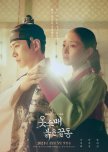
An Anti-Romance in the Best Possible Way
The Red Sleeve does something I never thought I’d see in a K-drama - it dares to suggest that love may not conquer all. Most “romantic” sageuks start with the premise that every commoner or court lady dreams of being swept off her feet by a handsome prince, but few look closely at the power dynamics of such relationships, especially in the Joseon era where the patriarchy was so rigid that even the most powerful woman in the kingdom, the Queen Dowager, was essentially under house arrest. To its credit, The Red Sleeve centers this fundamental inequality, suggesting that consenting relationships are impossible if one person is the master and the other, functionally, a slave. It’s also smart enough to feature one of Joseon’s “best” kings as its male lead, emphasizing that the issue is systemic, not individual, and that no ruler, no matter how just, upright and swoony can be an ideal partner as long as they view their love interest as a possession. And when a woman must obey, the line between rape and mutual affection quickly blurs, even if the man is doing it “for her own good.” The discomfort the show induces is magnified by the fact that it includes no easy villains. Everyone has an agenda, but everyone is also trying to do their best in a world where protocol and order take precedence over human feeling. But when human feelings must be excised in the name of duty, the drama reminds us that it’s often women who take the fall. It asks us to reconsider whose lives matter, and argues that agency, even the agency to choose heartbreak, may be preferable to even the dreamiest of suitors.Was this review helpful to you?
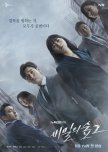
From a storytelling perspective, the show starts slowly, spending the first several hours on seemingly trivial details. However, things pick up around episode 6 and the disparate narrative threads come together into a compelling whole. Its focus on the power struggles within Korean law enforcement recognizes that how a society pursues justice ultimately determines whether or not it will obtain it. Heroic cops and prosecutors like Yeo Jin and Shi Mok are great, but they are only as effective as the institutions they represent.
Was this review helpful to you?
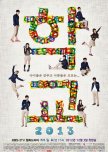
Was this review helpful to you?

While I don’t claim to have emerged from the show as an expert on cooking the books, the writer’s clearly done his research, displaying an impressive command of both the intricacies of financial fraud and the real world pain that such chicanery can cause. The drama argues that the devil is often very much in the details, showing how numbers on spreadsheets can destroy lives. While there’s tons of broad humor, the rage at the specific ways the system’s rigged is palpable, and the show knows how to land its serious moments as effectively as its silly ones. Best of all, it allows its characters to grow and change. Its sinners aren’t magically transformed into saints, but they learn how to come together to fight for a better future for themselves and others.
Was this review helpful to you?
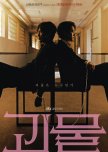
Most murder mysteries focus on solving the crime, but this one explores the damage left behind – the way friendships and communities fray, the guilt of survivors, the difficulty of finding closure, the fact that neither vengeance nor arrests are ever really “enough.” The show also recognizes that atonement is an action taken, not a gift bestowed. It never lets its characters escape responsibility for their choices, but it also grants the option of redemption. There is a lot of darkness in this world, but it suggests that even at our most broken, we are worthy of love and capable of grace.
Was this review helpful to you?
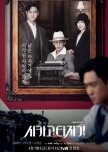
Was this review helpful to you?

Was this review helpful to you?

Was this review helpful to you?
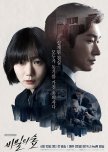
The show does drag out the denouement, with more moralizing speeches than I’d prefer. It’s also not a ringing endorsement of the idea that people can change. It is however, a lovely example of how good writing, acting and directing can bring an old genre to vibrant, urgent life.
Was this review helpful to you?

The plot mechanics, on the other hand, are less effective. There are tons of intriguing set-ups that never pay off in meaningful ways, and the story takes an awfully long time to build to anything approaching actual rebellion. It also introduces a supernatural element that’s too literal to be read as symbolic but too underdeveloped to serve as a unifying mythology. It ends up feeling like a distraction from the very real issues that the characters confront – an easy way to get the characters out of trouble (hey look, super powers!) without serving any broader thematic purpose. In the end, the show is solid, but I wish its dramatic revelations were as engaging as its revolutionary ideas.
Was this review helpful to you?

This review may contain spoilers
Somewhere inside Goblin, buried under a mound of PPL and tears, is a good show trying to get out. The first two episodes suggest what might have been, deftly mixing intense action and off-beat humor in a dark world filled with ominous reapers, wounded goblins, ghost-seeing teenagers and cabbage-wielding grannies. The stage seems set for a life and death clash of epic proportions. Alas, it soon becomes apparent that the writer forgot to include an antagonist. The goblin-reaper face-off devolves into a chummy bromance, leaving “fate” to play the role of spoiler. Unfortunately, it’s hard to fight disembodied destiny. Whole episodes are spent weeping in pretty scenery and eating Subway sandwiches. The talented cast tries to up the urgency, but with nothing tangible to battle, the pacing slows to a crawl. The extended episode lengths and the director’s tendency to linger a little too long on every moment exacerbate the problem. Even the romance falters on the uncomfortable age gap between the protagonists.Every so often. interesting ideas pop up about guilt, redemption, and the role of kindness in a cosmos more random than rewarding. Alas, the fickle gods that rule this universe stay above the fray. A drama that actually allowed its characters to take them on rather than simply lamenting their cruelty could have been powerful indeed.
Was this review helpful to you?

What starts as an engaging meditation on how artistic works can take on a life of their own devolves into a jumble of incomprehensible rules and mangled timelines. The bigger thematic ideas get lost as you sense the actual writer struggling every bit as much as her cartoonist antihero to give her work an ending. And unfortunately, just like him, she can’t seal the deal. In a world where everyone can magically draw (or write) themselves out of difficulty, the act of creation gets reduced to expediency, not art. The fans within the show know something’s gone awry, but, alas, the fans in the “real”, real world are left hanging too. As a metaphor for how stories slip away from their authors, this one turns out to be a bit too apt.
Was this review helpful to you?
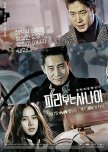
Was this review helpful to you?

